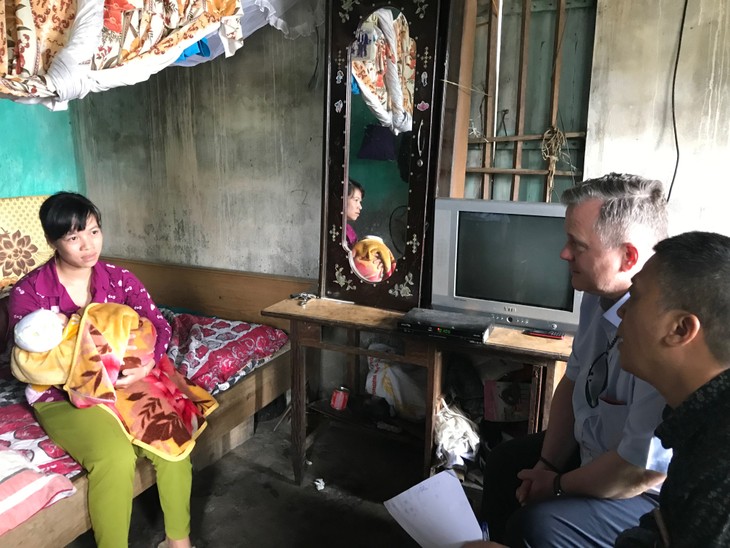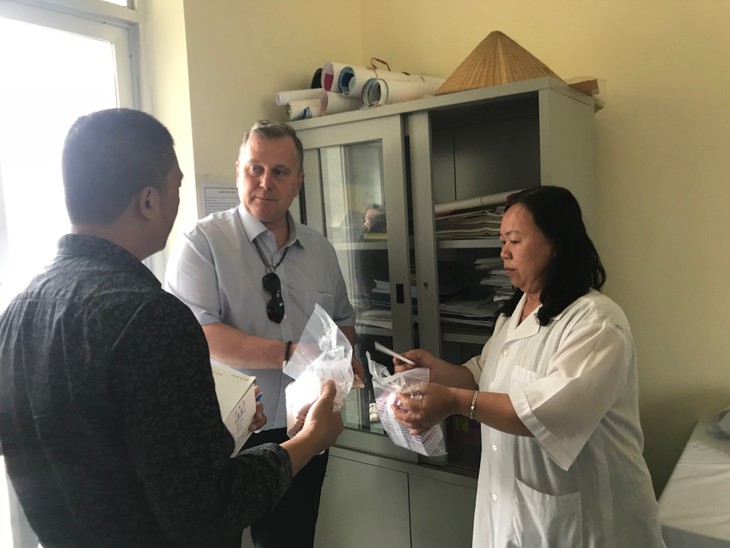(VOVWORLD) - The United Nations Population Fund (UNFPA) said reproductive health problems are a leading cause of ill health and death for women and girls of childbearing age in developing countries. Over the past few years, Quang Ninh province has paid much attention to making sure that all citizens from rural to urban areas receive appropriate medical services for sexual and reproductive health. Its progress has caught the attention of the UN agency, which promotes health and equal opportunities for all people. VOV reporter followed UNFPA’s delegation to visit health centers in Van Don district, Quang Ninh province.
Our first stop was 26-year-old Lieu Thi Tan’s small house near the river that she borrowed from a relative. Since Tan got married to her husband, who is a fisherman, they have been living and going fishing every day on their boat. She has been staying at her relative’s house since she gave birth to her second child two months ago. During her pregnancy with both children, she only went on shore when it was time for her regular prenatal check-up.
“The medical staff from the communal health center have taken very good care of me," Tan said, "They kept track of my pregnancy and called to remind me every time the prenantal check-up was due, or to take injections. They helped me give birth as well,” Tan said.
 UNFPA representatives visit Lieu Thi Tan in Van Don district UNFPA representatives visit Lieu Thi Tan in Van Don district |
Reproductive health care is the daily work of the staff at Van Yen commune’s health center. There are 4 officials at the facility, 2 assistant doctors and 2 nurses, who take care of more than 1400 citizens. The population is thinly scattered due to the mountainous terrain, but the staff try to make sure all people get their services.
“We have a total of 30 expectant mothers in the commune, all of whom get 4 prenatal check-ups, and none has to give birth at home. We also go to their houses for postnatal check-ups. Previously, it took much effort to persuade people to receive medical care. But now they tend to have fewer children and are already aware of reproductive health care. We have contraceptive injections and pills, birth control implants, and free men condoms,” said Le Thi Chien, who has been working at the center for 30 years.
 Le Thi Chien introduces her health center's services and medicines to UNFPA representatives. Le Thi Chien introduces her health center's services and medicines to UNFPA representatives. |
Chien took the visitors on a tour of the clinics at her health center, and introduced their services. Bjorn Andersson, regional director of UNFPA Asia-Pacific commented:“The medical staff are doing a heroic job. The nurses and doctors here have c;pse contact with the patients. With a pregnant woman, I’m sure they also discuss with her other health issues.”
The tour continued to the obstetrics department of Van Don district’s health center. In addition to regular prenatal check-ups and normal delivery, the department is also in charge of emergencies such as ectopic pregnancies, twisted ovarian cysts, and postnatal uterine bleeding.
For the past 10 years, the department has had a program to prevent mother-to-child HIV transmission, in which nearly 100% of children have tested negative for HIV. The department also takes samples and sends them to provincial hospitals for cervical cancer testing.
Doctor Vu Thi Thanh Thuy, head of the department, appreciates the close connection between the district’s health center and higher-level hospitals.
“Higher-level health centers and hospitals often send doctors to our center to help us diagnose and treat patients with serious diseases, including emergency operations and endoscopic cervical disectomy surgery. For patients in critical condition, we get a lot of support when we transfer them to provincial hospitals. This close connection has helped us improve our operation remarkably,” Thuy noted.
Bjorn told VOV his impressions after visiting the health centers in Van Don district: "I got a very good impression of what was happening in the clinics and how the patients seem to be treated. What was interesting for me is that I could engage in dialogues with a patient and then with the district level, so I could see the whole chain.”
Since the UNFPA became active in Viet Nam in 1977, it has been paying much attention to improving people’s access to quality sexual and reproductive health services through better population data and policy dialogues. Bjorn believes what he learned from the visits is a great example of Vietnam’s progress in ensuring sexual and reproductive health care and useful information for regional countries.
“What I think is beneficial both UNFPA and Vietnam is the interaction how the UNFPA can bring new ideas to Vietnam and how we can take what works for Vietnam to the regional and global level. Vietnam has a great capacity,” he said.